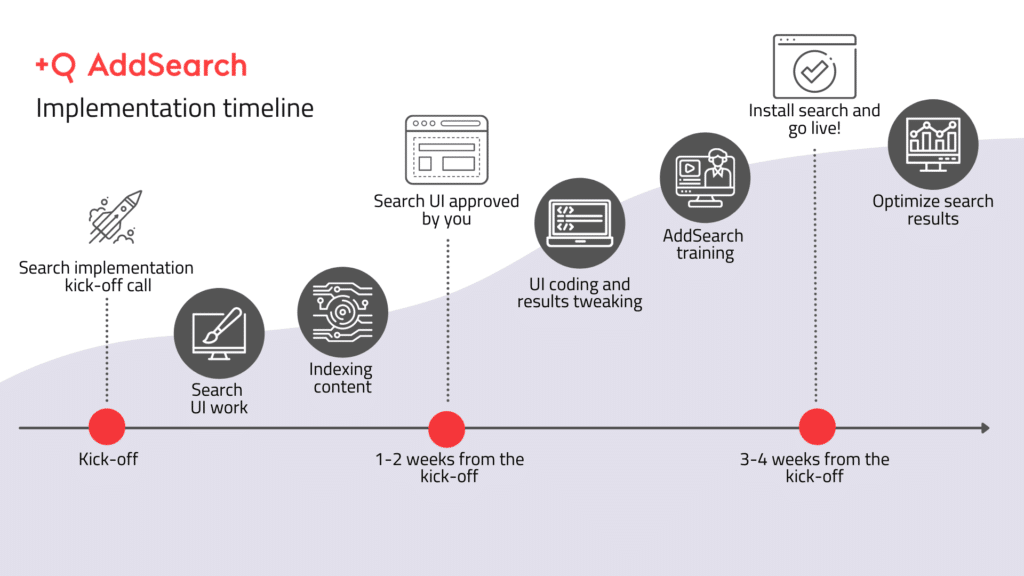Site search is not a new phenomenon. Nearly 55% of businesses have had site search enabled on their websites for more than five years. However, as online presence has become an essential part of the customer journey, many are forced to re-evaluate the impact various parts of their website have on customer experience – site search among them. Many businesses now recognize that site search is non-negotiable, especially given website visitors’ short attention spans and the burgeoning quantities of information that they have to sift through. Understanding that something is needed, however, is different from being able to calculate and demonstrate its value to ever more IT-savvy stakeholders and management. Once you’ve gotten them (and your site search solution) on board, it’s also important to be able to focus on maximizing your site search ROI. Since AddSearch has been helping our customers get the best ROI from site search, we decided to break it down.
Table of Contents
Maximizing Site Search ROI: The Factors
Calculating ROI to make a business case for site search involves assessing the efficiency of your investment by comparing its costs with its gains. As with most investment decisions, the pay-off from site search is really seen in its results, which comes after the initial outlay.
To get a clear picture of where you can most effectively increase your ROI, let’s split the journey into three phases: Implementation, Maintenance, and Results. Since we talk quite a bit about the benefits of site search and how to get results from it, we’ll start with how to assess the costs.
Part 1: Site Search Implementation
The obvious place to start would be the beginning. For many companies, this involves deciding whether to build their own search function or to buy from a provider. Which would give you the better site search ROI? It would depend on your requirements as well as existing capabilities: how much do you need to customize, do you have a team that’s big enough with expertise in this area, and how fast do you want to get up and running? We have a post with a more detailed analysis of the build vs. buy equation, but let’s consider some costs you would need to take into account during the implementation phase:
Cost of purchase
If you decide to purchase a hosted site search solution, then your site search ROI calculations are comparatively simple. You have a fixed monthly cost or a quotation to work with and your site search provider does the legwork for you. An additional advantage is that you can often select the tier that works best for your requirements.
For example, as you can see with AddSearch’s pricing plan, a business can determine their needs, try out the tools, and select the plan that would give them the best return on investment. We find that for many of our customers, the Premium plan offers the best ROI because it lets them leverage the expertise of our developers and designers to create a custom search UI for them.
You may also be thinking about whether to use an open-source solution for its lower initial outlay. However, you would also need to factor in the cost of the resources that you will have to commit to customizing the solution and building it into what you need for your business.
Developer cost x no. of hours
Whether deciding to DIY your on-site search, one of the main resources you will need to account for is your team of developers. If you have the skills on your team, you may be contemplating building it yourself, especially if you are already building your website. After all, who knows your requirements better than your team? This is where the first site search ROI calculation really kicks in: is it going to be more cost-effective to purchase a solution or dedicate your team to this endeavor? To do that you have to figure out the resource hours that it will take. This brings us to the timeline.
Time costs
How expensive is your time? Going by the previous equation, it might be easy to assume that the longer implementation takes you, the higher your costs are going to be. But a shorter implementation timeline could mean either using specialist developers or putting more people on the job and on research, which increases your resource cost.
Time still is a factor even if you decide to purchase a solution because the longer it takes to implement, that’s more time you’re spending not enjoying the benefits of more effective site search. So even though you benefit from a dedicated specialist team working on your site search, that is an important conversation to have with your provider.
To maximize your site search ROI, figure out how much time you’re able to commit to getting your site search up and running, discuss that with your team and formulate a realistic implementation plan. It’s crucial that you have goalposts so that you’re able to track progress, ensure accountability and avoid creep.
Here’s an example of an implementation timeline that we have at AddSearch. (Keep in mind that this varies based on the client’s requirements, so you wouldn’t want to use this as a benchmark for all projects.)

Other considerations in implementation
Some less quantifiable aspects bear consideration too. Although they don’t have a direct bearing on the ROI of site search, they may impact your business process or goals. One of these could be the flexibility you have when hosting it on your own server. Your business needs are unique – and so are the challenges you will face. Consider the hidden costs too, for a well-rounded business case.
Part 2: Maintenance costs for site search
So you’ve got your site search working, in time, and under budget. Great! Does that mean it’s game over for the cost phase of our site search ROI calculations? Unfortunately not. Sure, site search works alright on its own, but to get the highest return on your investment, it needs to be an interactive process – a journey rather than a destination.
Your team
Are you dedicating a team to maintaining your site search? If you’ve developed your site search in-house, the commitment doesn’t end at the implementation phase. There needs to be a plan for research and further development, as technology keeps evolving and you want your customers to have the best possible experience at any given time.
You wouldn’t need to worry about research costs as much if you buy your site search, since site search providers are constantly updating their solutions. However, do account for the team (or team member) that will need to monitor and analyze the data from your site search and make the changes necessary to use it to its full potential.
Training your team on how to leverage site search to improve conversions and how to produce content based on the data you get from your site search results means integrating site search into how your marketing team functions. You will need to rethink certain processes and make sure your team gets the support and training they need to maximize your site search ROI. It may look complex, but the results are worth it.
The good news is that there is a lot of information available if you know where to look, and a good site search tool will also come with a responsive support team who will guide you through the process. In an ideal situation, the interface would be user-friendly, and the documentation would also be easy to follow. (Remember those hidden costs we were talking about earlier? Check out the support you’ll get before you commit.)
Contact our sales team to explore how to increase conversions, reduce helpdesk costs and make your customers happy.

Making adjustments
Data from years of helping clients maximize their returns has shown us that the best site search ROI comes from actively working with it, using multiple features, and planning for the long term. Sure, you’ll get more conversions just by having an internal site search on your website, but don’t you want more than that? When your search results are more relevant to them, your customers find what they need quicker, are more satisfied, and are likely to stay on your website longer (for the right reasons, not because it takes them longer to find what they need).
This harks back to the implementation phase, but having a team that has supported multiple clients through getting their site search set up can boost your ROI. They can show you what to look for and make adjustments to configurations that will yield better results right from the start.
Having a support team that is committed to making sure you are getting the most out of your site search is another success factor in maximizing your ROI. They will be able to offer solutions, reducing the time you spend trying to find answers.
We’ve also found that intelligent site search is a long-term tool. Take our AI-powered progressive ranking feature, for example. The more traffic you feed it, the better able it is to recognize how your customers behave and adjust your search results accordingly, giving them what they want faster. So, the efficiency of the solution you choose and how fast it can learn will also impact your site search ROI.

Part 3: Measuring your results from site search
We’ve talked in detail about the costs you can incur and a little about how you can make sure you get returns. Now we need to balance the equation and look at how to measure your return on site search.
Revenue & conversions
It’s necessary to recognize when calculating ROI that while site search can increase your conversion rate, whether that translates directly into revenue or not will depend on your business model. If yours is an eCommerce business, it’s a straightforward calculation – any increase in conversions that you can attribute to site search goes directly toward your site search ROI. For other industries, you may want to consider your site’s role in revenue generation and what impact conversions have on meeting your organization’s targets. If you want more information on how to find out how well site search is working for you, the linked post shares some ways to put your results in context.
However, as we’ve discussed, site search exists as part of an ecosystem, so at any given time, there are a number of other factors contributing to why customers buy from you. Adjusting for any changes you’ve made in your marketing and seasonal fluctuations will help you get a clearer picture of what site search is doing for your bottom line.
Reduced support costs for customers
As site search makes information more accessible to your customers, across sites and platforms that you use, you will find that they rely on your support and helpdesk personnel less. Anything that reduces an expense should count towards your ROI, so make sure you measure the less obvious benefits for a holistic calculation.

Social proof
Hearing what others using site search have to say can also be a useful way to evaluate what kind of ROI you can expect to get. That is true especially if you decide to go with an established provider rather than building your search. Check out review sites like G2 and Capterra and learn how other businesses are faring with their providers. This might be a good time for us to point out that G2 has confirmed AddSearch as the search solution provider with the best estimated ROI for 2022 too, but don’t just take our word for it, run the calculations, and check out what our customers have to say.
Less visible benefits
There are some aspects of having site search that are not as easily quantifiable: How do you measure the benefit to customers of providing a modern, seamless customer experience? How much value does your business place on being able to have information accessible online in one place for its customers?
Whatever steps you take to maximize your site search’s ROI, you will find that it leads you to a richer customer experience. That’s because at the heart of improving your site search is one thing: asking your customer to tell you what they are looking for and then giving them what they want.









